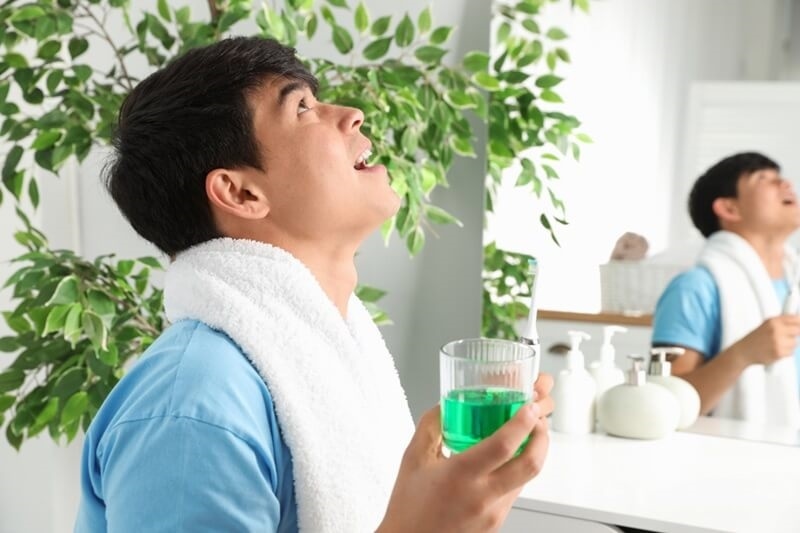
Mouthwash is one of those things people either swear by or totally forget about. You see it in the commercials — someone takes a dramatic swig, swishes confidently, and spits out a minty waterfall. But in real life? Most of us grab it only when our breath’s acting up before a meeting or date. So, what’s the deal? Is it actually helping, or is it just an optional add-on? Let’s dig into what it really does, how to use it right, and why some types of oral rinse might actually make a noticeable difference if you know what you’re doing.
Before we jump into the hype, let’s clear this up — mouthwash isn’t just “minty water.” It’s a liquid designed to reach where your toothbrush and floss can’t. Some are antibacterial, others focus on strengthening enamel, and some just freshen up your breath. The thing is, there’s no one-size-fits-all option. The right one depends on your mouth’s actual needs. There are multiple mouthwash types on the market — alcohol-based, fluoride-based, natural, and even prescription rinses your dentist might suggest. The key is picking one that fits your goals — cavity protection, gum health, or just keeping your breath on point.

This is where most people’s curiosity peaks — what does it actually do besides make your mouth feel fresh? Here’s the truth.
The most obvious one, sure. But not all freshness is created equal. Cheap rinses often mask odor for half an hour, then vanish. The right mouthwash use kills odor-causing bacteria instead of covering them up. That’s why dentists call it a “finishing touch,” not a substitute for brushing.
Plaque forms invisibly, and brushing alone can’t always stop it. A good antibacterial rinse helps target bacteria that cling to your gums and teeth. It doesn’t scrub them away — it weakens them so your brushing routine can do the rest. Think of it as your mouth’s backup defence team.
If your diet includes soda, coffee, or citrus, enamel takes a hit. A fluoride rinse rebuilds microscopic weak spots and makes your teeth stronger over time. It’s especially useful if you’ve had cavities in the past or wear braces.
Ever had tender gums that bleed easily when brushing? That’s early-stage gum irritation. A mild oral rinse with antibacterial ingredients can help calm it down. The key is using it consistently, not just when you remember once a week.
This one’s big. Fluoride in mouthwash strengthens enamel, making it harder for acid and bacteria to eat through it. It’s not instant magic, but over weeks, it really helps. So yes, this small step can save you a painful dentist visit.
Most people do this part wrong. Here’s how it should go. Brush first, floss second, rinse last. Always spit out toothpaste fully before rinsing. Pour about 20 ml — not half a cup — and swish for a full 30 seconds. It’ll feel like forever, but that’s how it works. And whatever you do, don’t rinse with water afterwards. You’ll just wash away all the protective stuff that’s supposed to stay behind. Use it twice daily — morning and before bed. More isn’t better here; it can dry your mouth out if you overdo it.
There are a few things people keep getting wrong, so let’s settle them. One: mouthwash isn’t a replacement for brushing. It can’t scrub off plaque or food particles. Two: all mouthwashes aren’t equal. Some are just for breath; others are for full protection. Check the ingredients before assuming it does everything. Three: that burning sensation? It’s not proof it’s working. It’s just the alcohol, and it can actually irritate your gums if you use it too often. Four: it doesn’t kill all bacteria — and that’s good. Your mouth needs some healthy bacteria to keep things balanced.
Walk into any pharmacy and you’ll see at least 20 bottles claiming to do everything. The trick is knowing what you actually need. If you just want freshness, go for a light oral rinse with essential oils or mild mint. If your gums tend to bleed, you’ll benefit from an antibacterial rinse made for gingivitis or sensitive gums. If you’re worried about cavities, grab a fluoride rinse. There are even alcohol-free and natural options with aloe vera or herbal extracts for people with dry or sensitive mouths. Don’t let the flashy “kills 99.9% of germs” labels fool you — sometimes gentle works better.
Kids love the idea of mouthwash because it feels grown-up. But under six? Not a good idea. They tend to swallow it, and swallowing fluoride isn’t safe in large amounts. Once they’re older, child-safe formulas are fine — alcohol-free, mild, and often bubblegum-flavored to make brushing less of a chore. Just make sure they spit it out and don’t rinse afterward. Start small and supervised, and make it part of their evening routine once they’re consistent with brushing.
Here’s where moderation matters. If you’re using a strong alcohol-based rinse several times a day, you’re likely doing more harm than good. Overuse can dry your mouth, irritate tissues, and even throw off your mouth’s natural bacteria balance. If your mouth burns or tastes off after rinsing, switch to something milder. Also, avoid mouthwash right after dental procedures unless your dentist recommends it — it can slow healing.
Let’s face it — morning breath happens to everyone. So does post-coffee breath. Mouthwash helps, but only if you use it right. A mouthwash use routine doesn’t fix the root cause if you’re skipping flossing or drinking too little water. It works best as part of a system — brush, floss, rinse. If your bad breath sticks around no matter what, you might be dealing with dry mouth, gum problems, or something deeper. In that case, a dentist visit beats another bottle of mint rinse.
If you think of dental care as a 3-step system — brushing, flossing, and rinsing — mouthwash is the easy last step most people skip. It’s not essential like brushing, but it adds real protection when done right. Think of it like sunscreen — brushing is cleaning, mouthwash is the shield. Twice a day is enough. Pick one that suits your mouth, and don’t swap it every week based on ads. Consistency wins.
Not everyone likes commercial formulas. Saltwater rinses are simple, safe, and surprisingly effective for reducing bacteria and soothing gums. Herbal options like aloe vera, tea tree oil, or chamomile work too, especially if you want to avoid alcohol or artificial colors. They won’t replace fluoride-based rinses for cavity prevention, but they’re great for daily freshness and comfort.
Here’s the honest answer — not everyone needs it, but almost everyone benefits from it. If you brush and floss perfectly twice a day, you’re already doing great. But for most people, there are always little gaps, tricky corners, or rushed mornings. That’s where rinsing helps. The mouthwash benefits stack up over time: fresher breath, fewer cavities, stronger enamel, and healthier gums. And that clean, just-left-the-dentist feeling? You get a bit of that every day.
So next time you’re in the bathroom and see that bottle sitting in the corner, give it a chance. Thirty seconds of swishing might not seem like much — but your mouth will thank you later.
This content was created by AI